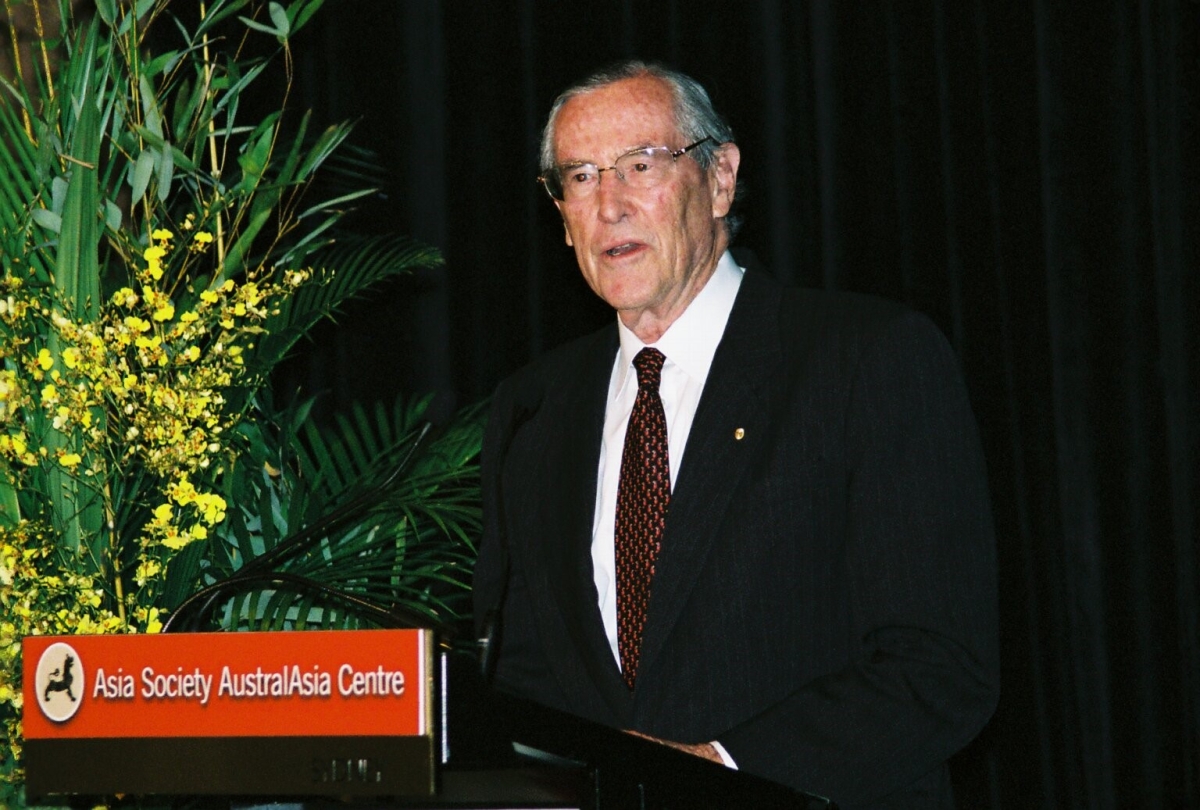A Tribute to Dick Woolcott - diplomat, mentor and storyteller
by Philipp Ivanov

- I am Dick Woolcott. Thank you for your presentation. Very interesting. I have a question.
Richard Woolcott - Australia’s best-known diplomat, always impeccably dressed, sharp in both appearance and intellect – was most of the time the first to ask a question at briefings I hosted as a newly minted head of Asia Society Australia. To add to my anxiety about the new job and responsibility, he was also my much more famous predecessor – having been the founding director of Asia Society Australia when it started in 1997.
But my nervousness dissipated the moment we met. We got along immediately – something that most of Dick’s acquaintances would say about the start of their relationship with him.
Over the course of the next few years, he became a good friend, mentor, and a source of unparalleled wisdom about how Australia works, how it views the world and conducts its international affairs. I had just come out of 4 years at the Australian Department of Foreign Affairs and Trade – a rich, life-changing experience, but my conversations with Dick in his Potts Point apartment taught me more about our place in the world than I could ever imagine.
It’s impossible to recap Dick’s stories. They are only his to tell – and many are documented in his books and photos, and in memories of the many people who knew him.
To me, the most insightful was Dick’s attitude to life, people, and his work as a diplomat. His curiosity, respect for difference and a sense of humour were fundamental to how he conducted himself professionally, personally, and how he viewed the world.
Dick was a curious man. His biography is a story of a man on a mission to experience and learn about the world. From Moscow to Timbuktu, Jakarta to Manila, Geelong to Canberra. It was this curiosity that was attractive to his interlocutors – from villagers and students to heads of state and dignitaries. It is what made him such an effective diplomat. It was also the source of his impatience about the inevitable periods of time he had to spend in Canberra. He acknowledged a few times that he was better and happier overseas than at home.
His respect for differences – cultural, political and personal – was at the core of his character. It is easy to acknowledge diversity of views mentally and intellectually. It’s much harder to accept and express it. Dick did it brilliantly – be it with dictators abroad or ministers at home. It was critical for his diplomatic work in Asia, the region he loved most and where his contribution to Australia is the most impactful. His belief in the vital importance of deepening our ties to the region – in all its diversity and complexity – helped shape many of the institutions and threads of engagement that we now take for granted – from APEC to our relationship with Indonesia.
His most endearing quality – at least to me – was his humour and insistence on not taking himself too seriously. Australian foreign policy is rarely a laughing matter. Diplomacy is often about managing egos and personalities, as much as it is about policy issues and substance. Humour is a powerful disarming tool, even in the most serious circumstances. In many of Dick’s stories, he never shied away from making himself the subject of laughter. His ego was always present, but he never let it escape the scrutiny of humour. Many times, after speaking to him, I felt the world perhaps was not as dangerous or hopeless.
With Dick the world was first and foremost human.
His life is a tale of adventure, ambition, harnessing and managing influence and being open to chance.
It was a combination of chance and conviction that made Dick one of Australia’s most effective advocates and practionioners of Asia engagement of the 1970s and 1980s during the optimistic and hopeful dawn of the Asian century that came to a conclusive close with the arrival of China’s Xi Jinping and the start of a new contested Asia. His passing is almost a bookmark or a closed chapter in Australia’s ever evolving relationship with our region. For Australia - Dick’s departure is not unlike the highly symbolic passing of Gorbachev in the year when Russia started its brutal war on Ukraine, marking the end of Europe’s post-Soviet dream.
But Dick Woolcott’s legacy will live on – in the DNA of Australia’s foreign relations and in the minds of people who were influenced by him. His generosity with his time, knowledge and networks was legendary. In his characteristically casual manner, he helped shape perspectives of so many Australians who are passionate about our role in the world and in Asia. I am lucky to be one of them.
But above all, I will miss sitting on his balcony overlooking the Woolloomooloo wharf and hearing his stories.
A reflection from Philipp Ivanov.
